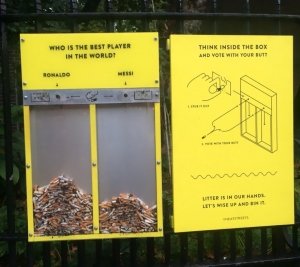Have you ever come across a small phrase in supermarkets, hotels, or any other public place that made you change your behaviour?
Some chances are designed in a way that you don’t even notice that you changed your behaviour. These changes, then, are a ‘nudge’.
A what?
A nudge is a concept in behavioural economics, political theory, and behavioural sciences. A nudge creates positive reinforcements and indirectly offers suggestions to the viewers about the ‘best’ options. The great thing about a nudge (or: nudging) is that it lets you believe that you made a particular decision voluntarily, but actually the nudge pushed you in a particular direction. Nudges are often designed to push people into a healthier lifestyle or make people more conscious about the environment. However, nudges can apply in many more situations.
It’s creative for sure!
The following pictures show some famous nudges. The first one dates back to the 1990s already. At Schiphol Airport in Amsterdam, the airport’s designers used a simple trick to improve bathroom cleanliness.
In the middle of both urinals, there is an image of a fly. This simple addition to the design made men, voluntarily, aim their business at those flies. The result of this simple nudge was astonishing. Bathrooms stayed a lot cleaner with a reduction of the spillage on the bathroom floor by 80%.
Another funny example comes from the environmental organization Hubbub. It created a nudge that made people quit throwing their cigarettes on the street.
The organization also did the same experiment including other sports references. This nudge also proved to be very successful. It made people reduce cigarette litter by 46% in the UK. Because of this success in behavioural change, some places in America installed the same nudges, which resulted in a reduction of 74% there.
There are tons of other simple cues that we might even use in our daily lifes, like using a smaller plate and eating less because of this small adjustment.
The downside of nudging
All the examples mentioned above are used in innocent situations. But since the core effect of nudging is to change peoples’ behaviour, companies can use it for less positive things. In addition, sometimes nudges get a lot of negative reactions since some people firmly believe that people should be completely free to decide what they are doing. Even though a nudge lets people make their own decisions, it still provides guidance. Some might argue, that this alone is already a loss in freedom of choice.
What is your opinion about nudges? Have you ever come across a nice one? And would you create one if you could steer people into a certain direction with it?
This post is by AIESEC in the Netherlands. We offer international voluntary projects and professional internships with the aim of developing leadership in youth.















